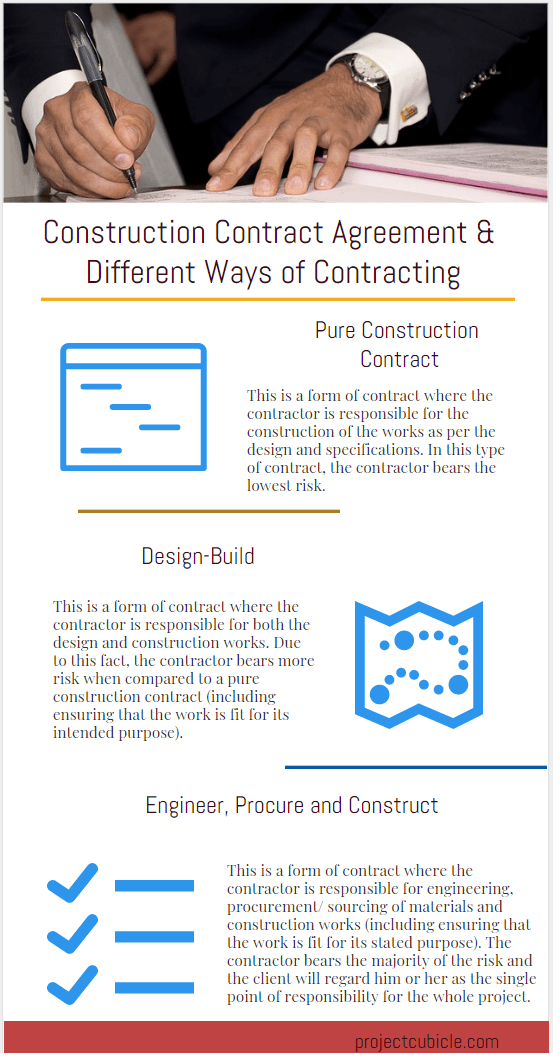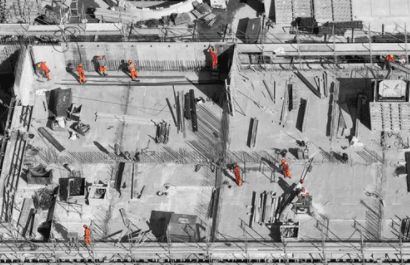Construction Contract Agreement & Different Types of Contracts
A construction contract agreement is an agreement between the owner and the contractor that determines the terms and conditions for construction works. It specifies the provisions and demonstrates what work needs to be done and which parties will participate in the construction project. There are several ways in which a prospective contractor can participate in a construction contract. Some examples are listed below:
Table of Contents
Main Contractor (General Contractor)
The contractor himself or herself concludes a contract with an employer to build or construct something. The main contractor is responsible for all the details of the total construction of the project. The main contractor is also known as the general contractor.
Joint Venture
In the construction industry, a joint venture is created by two or more contractors with shared ownership, returns, and risks. They then jointly sign a contract to build or construct all or some parts of the project. It is important to note that in this case, each contractor in the joint venture is responsible to the employer for all obligations under the contract. In other words, as between the employer and the members of the joint venture, each member of the joint venture is responsible for the actions or breach of any other member.
Sub Contractor
The subcontractor has a contract agreement for a construction project with the main contractor to complete a part of the works, and will not have any contract with or obligations to, or rights against, the client. Sub-contractors will always have the same responsibilities and rights as the main contractor. But since sub-contractors contract with the main contractor, these responsibilities and rights will be exercised by and between the sub-contractor and the main contractor.
The subcontractor does not have a contract with the employer, and in most instances does not have a relationship with them. In some instances, however, the client can take up this responsibility
When an employer wants to use a sub-contractor of their choice, the sub-contractor is referred to as a “nominated sub-contractor” and in certain instances; the client will take up risk due to its nomination.
General contractors often use subcontractors to perform some of the works that require expertise and technology. For example, a general contractor may perform the civil works itself and use the subcontractor for plumbing, heating, and air-conditioning works. Depending on the size, type, and complexity of the project, various types of subcontractors can be used by the main contractors. Before discussing contract agreements for construction projects, let’s take a glance at the main contract documents in the construction industry.
Contract Documents
In a construction project, the owner or the consultant prepares documents for the tendering process. These documents are the contract documents that will be included in the contract. Typically, contract documents include but not limited to the following,
- General Terms and Conditions
- Special Terms and Conditions
- Drawings
- Technical Specifications
- Bill of Quantities
- Contractor Bid
- Statement of Work
- Work Schedule
Contract Arrangements for Construction Projects
A construction contract is an agreement between the parties involved in the construction project to perform the works as per the agreed terms and conditions. These can be created by standard form contracts or catered for/ created on a bespoke basis. Typically, a construction contract includes general and specific terms, details of project scope, technical specifications, tolerance limits, cost breakdown, and penalties for delays. It ensures the parties’ rights and obligations that are involved in the project.
Construction companies often have templates that are used to facilitate the contracting process. Templates specify general conditions, rates, standards, and other important points. On the other hand, each project has its own specific terms and requirements. Therefore, some modifications should be made to each construction contract agreement between owner & contractor to ensure the contract will cover all necessary items.
Below are the most commonly used contract agreements for construction works.
Pure Construction Contracts
This is a form of contract where the contractor is responsible for the construction of the works as per the design and specifications. In this type of contract, the contractor bears the lowest risk. The price is often measurable, based on a bill of quantities (a document detailing specific prices for services and goods the contractor will provide) since the design is not usually complete and fully available at the date that project work will start.
Design-Build Contracts
This is a form of contract where the contractor is responsible for both the design and construction works. Due to this fact, the contractor bears more risk when compared to a pure construction contract (including ensuring that the work is fit for its intended purpose). Therefore, this is a moderately priced arrangement; usually, a fixed lump sum price is required for doing both design and construction, but appropriate adjustments to the price are provided for events outside of the contractor’s responsibility
Engineer, Procure and Construct Contracts
This is a form of contract where the contractor is responsible for engineering, procurement/ sourcing of materials, and construction works (including ensuring that the work is fit for its stated purpose). The contractor bears the majority of the risk and the client will regard him or her as the single point of responsibility for the whole project. This is, therefore, the most expensive type of arrangement. The contractor is usually required to provide a lump sum price, with fewer entitlements to adjustments than under any other arrangement, and must therefore appropriately price in the risk.
Conclusion
A construction contract is a formal document that can be enforced under certain laws. There are different types of contract agreements between owner & contractor in the construction industry. Each type has pros and cons from the owner’s and the contractor’s point of view. In the pure construction contract types, the contractor bears the lowest risk because the price is often measurable. In the design-build contracts, the contractor bears more risks because he is responsible for both design and construction works. Lastly, the contractor bears much more risks in the engineer procure and construct contracts.
Read Also
Senior Planning Engineer










